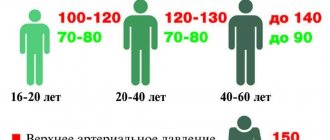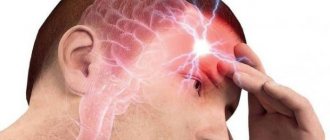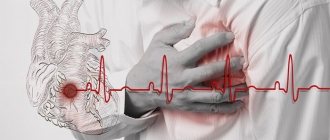VSD is a common set of symptoms that in our time has affected not only adults, but also children. There are many causes for this disease, and therefore each clinical case has its own individual characteristics and many approaches to treatment. A common symptom – surges in blood pressure – also cannot be called constant and unambiguous. Pressure during VSD can either increase or decrease, leaving the diagnosis legitimate. With this disease, it is important to understand that “blood pressure instability” is a symptom that disarms the patient in the face of many life-threatening situations.
Over many years of observing, diagnosing and treating patients, specialists at the Yusupov Hospital have proven their ability to help patients solve their problems, improve their quality of life, and move from “tolerate” to “overcome.” Doctors at the Yusupov Hospital will help determine possible causes and select medications that will help a specific patient and in a specific clinical situation.
High blood pressure - causes and symptoms
An increase in blood pressure is most often a reaction of the human body to an irritant (stress, hormonal changes, climate change, etc.). The body, in turn, compensatoryly increases the heart rate, causing the heart to work harder and with greater force. But the opposite situation also happens - when high blood pressure is accompanied by a low heart rate. The reason for this is impaired regulation of the cardiovascular system. With low heart rate and high blood pressure, the brain and heart are primarily affected. Disruption of the blood supply to these organs can threaten the patient's life, so he needs immediate examination and treatment.
Over time, pressure surges become more and more common. This affects a person’s well-being. Symptoms that may bother the patient:
- increased heart rate;
- dizziness;
- headaches of different localization;
- chills or fever;
- short-term visual impairment (“spots”).
These symptoms make a person forget about everything and concentrate only on how he feels, thereby aggravating the situation. When measured with a tonometer, the increase in blood pressure can reach extremely high numbers. At the same time, the headache intensifies, the heartbeat quickens, and the fear of death appears. Despite such poor health, these pressure surges do not carry with them serious consequences. In no more than two hours, the crisis will end with increased urination.
In this case, it is very important to differentiate high blood pressure from a hypertensive crisis, which is dangerous to the health and life of the patient and requires urgent therapeutic measures.
Causes of vegetative-vascular dystonia
To get rid of vegetative-vascular dystonia, it is first necessary to identify the cause of the disease. An experienced neurologist can do this.
Autonomic dysfunction can occur for one of the following reasons or a combination of them:
- factor of hereditary predisposition (in this case, manifestations of VSD appear already in childhood)
- past acute and chronic infectious diseases or intoxication
- chronic psycho-emotional stress, depression, sleep disorders
- sedentary lifestyle, sedentary work and, as a consequence, poor posture and cervical osteochondrosis
- bad habits (smoking, drinking alcohol)
- as a consequence of chronic disease of the endocrine (hormonal changes), cardiovascular system, gastrointestinal tract and nutritional disorders
- diseases of the central and peripheral nervous system.
Low blood pressure - causes and symptoms
Low blood pressure is also a complication of VSD, causing no less trouble for patients. The patient's body reacts to irritating factors by dilating peripheral vessels, and inhibition dominates in the central nervous system. Patients justify low blood pressure for themselves with all sorts of secondary reasons, without noticing other symptoms.
The most common symptoms of low blood pressure are:
- excessive weakness;
- pathological fatigue;
- increased drowsiness, light sleep itself, frequent nightmares;
- dizziness to the point of fainting;
- impairment of cognitive functions (memory, attention, concentration).
Why does blood pressure increase with dystonia?
The main factor in increased blood pressure in people with VSD is usually a malfunction of the sympathoadrenal system. It consists of the adrenal glands and the sympathetic division of the autonomic nervous system. This is our weapon in times of stress. When we need to get together and act quickly, we are helped by the release of adrenaline and an increase in the tone of the sympathetic nervous system. In autonomic dysfunction (VSD), this mechanism is disrupted. In tense moments, the excitement can be too strong, and instead of doing any good, it can completely incapacitate the person. A very minor reason can cause an inappropriately strong reaction to stress. Vascular tone increases and blood pressure rises.
Treatment of manifestations of VSD in Moscow
Due to the fact that VSD brings a lot of discomfort to the patient’s life, most begin to self-medicate. Pressure surges are so unstable and inconsistent that patients take several drugs from different groups that block each other’s action.
Treatment of VSD should begin only when the organic nature of the symptoms is excluded, because many diseases of the cardiovascular and endocrine systems, allergies, focal infections, etc. have a similar clinical picture.
VSD therapy is complex:
- lifestyle modification: proper nutrition, daily routine, stress management (possibly consulting a psychologist);
- attracting specialists from various fields (gastroenterologists, endocrinologists, cardiologists, neurologists, etc.);
- drug treatment aimed at relieving autonomic disorders of VSD (Concor, Paxil, Teraligen);
- physiotherapeutic methods of treatment.
Due to constant anxiety, fear of attacks, drowsiness and disturbed sleep, patients cannot cope with this on their own. The prescribed drug "Paxil" successfully copes with its task - sleep improves, patients get rid of panic attacks, and anxiety goes away. An important feature of Paxil is its ability not to affect blood pressure, which allows it to be used in patients with both hyper- and hypotension.
For mild disorders, if treatment was started in a timely manner, Teraligen performed excellently. It has a mild sedative effect and begins to act almost immediately after administration. It is also important that the drug potentiates the effect of other drugs, so it has to be taken in small dosages, and patients really like this.
For patients with the hypertensive type of VSD, our specialists successfully prescribed the drug Concor, which blocks signals that stimulate the heart, to patients at the Yusupov Hospital.
Concor for VSD reduces the heart rate, normalizes heart rhythm, helping to reduce the heart's need for oxygen. Concor for VSD helps to reduce activity in the sympathetic department of the autonomic nervous system and acts directly on the heart muscle. Concor is a drug that has proven itself to normalize heart contractions in the presence of VSD. The dose of the drug is selected and adjusted only by the doctor.
Patients of the Yusupov Hospital note a quick and long-lasting effect, and if the dosage prescribed by our specialists was followed, no side effects were observed.
“Anaprilin” has also proven itself well for the treatment of VSD. Although this drug is non-selective and acts not only on cardiac receptors, it is the drug of choice when an immediate effect is needed. By reducing the strength and frequency of heart contractions and blocking the action of hormones, it reduces the heart's need for oxygen. Under the influence of anaprilin, blood pressure decreases during VSD. Patients note the advantage of Anaprilin for VSD in that it works quickly, and this is a priority.
Paying attention to the mechanism of increased pressure during VSD, it would be logical to talk about “Enap” in this article. The drug prevents the narrowing of the arteries, preventing the development of hypertension and preventing an increase in pressure during stress or the action of a reflex mechanism. This drug has shown a good effect in patients with frequent panic attacks, since under the influence of the drug the receptors become immune to adrenaline, which makes it possible to break the vicious circle and cope with the symptoms of VSD.
How to eliminate pressure surges during VSD?
To normalize blood pressure, complex treatment based on psychotherapeutic correction, medications and herbal medicine will be required.
How to eliminate pressure surges during VSD
Treatment with medications is aimed at eliminating the symptoms of VSD and normalizing blood pressure. The specialist prescribes sedatives based on medicinal herbs (valerian, motherwort, St. John's wort). In the presence of high blood pressure, drugs are prescribed to improve cerebral circulation (glycine, vinpocetine). To lower blood pressure, it is recommended to take antidepressants and tranquilizers, which will be prescribed by a psychotherapist on an individual basis. Herbal medicine is highly effective in the treatment of vegetative-vascular dystonia. The increased pressure returns to normal and the operation of the autonomous system is improved.
For treatment, a decoction of valerian, motherwort, lemon balm, mint, and chamomile is recommended. At low blood pressure, you should brew rose hips, nettles, calendula, and string. Each type of herb should be brewed separately and taken for 14 days. Psychotherapeutic treatment methods are necessary for people who suffer from vegetative-vascular dystonia. Especially if pressure surges occur against the background of psychosomatic disorders, fears, and depression. A psychotherapist will determine the true cause of the disease and help cope with panic attacks due to VSD. The patient learns to relax his body using effective relaxation techniques.
To eliminate unfavorable symptoms, you will need to reconsider your lifestyle and change it for the better.
Treatment of manifestations of VSD in Moscow
Medicine has always developed dynamically, and at the moment there is a whole host of effective treatment methods. The specialists of the Yusupov Hospital, using their accumulated knowledge and skills, never cease to absorb new knowledge. There is no panacea for all diseases, but this is not a reason to be alone with your problems. The clinic’s doctors find an individual approach, select the treatment necessary in a particular case, provide comfortable conditions, and help where your body could not cope. Don’t put up with the symptoms - make an appointment by calling the Yusupov Hospital.
Symptoms
Vegetative-vascular dystonia in adult sick people has different manifestations. Most often, VSD has a hidden course. Under the influence of increased stress or other negative circumstances, attacks occur. They occur suddenly and significantly impair the quality of life. Sympathetic dystonia is worse experienced by older people because they have chronic diseases.
There are manifestations of other diseases that are not directly related to the autonomic nervous system. If there are indicators of damage in the area of the heart and blood vessels, the neurologist diagnoses the presence of VSD.
In accordance with scientific articles, the signs of the diagnosis of VSD are:
- headaches - they always differ in severity and duration;
- dizziness;
- severe sweating (increased sweat secretion from the sebaceous glands);
- weakness and high fatigue;
- increased heart rate;
- noise in ears;
- fluctuations in body temperature;
- increased drowsiness, apathy;
- sudden mood changes;
- severe anxiety;
- panic attacks;
- darkening of the eyes, lightheadedness;
- hypochondria.
Panic attacks
Vascular parasympathetic pathology in patients is accompanied by panic attacks. This term refers to a strong fear of death that grips a person. The patient develops anxiety, turning into real horror.
The body sends impulses about danger, but does not find a way out of the situation. Such an attack lasts on average a quarter of an hour, the state of health is slowly restored.
Inability to fall asleep
Sleep problems are typical for all patients with VSD syndrome. Dysfunction in the nervous system manifests itself in the form of insomnia or increased sleepiness. Such symptoms are caused by various disorders in the function of the autonomic nervous system. This provokes a change in biorhythms.
With this disease, it is difficult for the patient to relax. His sleep is short-term. This causes increased sleepiness during the day. When the nervous system is damaged, memory is impaired, concentration deteriorates, and performance decreases. A long absence of normal sleep leads to the appearance of psycho-emotional abnormalities. The nervous system cannot cope with the stress, breakdowns appear.
Emotional instability
It is a consequence of insomnia. A person feels tired, resulting in sudden mood swings. After rest, the patient is quite cheerful, but after a certain time he begins to feel sad or even aggressive.
Change in skin tone
Caused by damage to vascular tone. The patient experiences a rapid flow of blood to the skin and an equally rapid outflow. The skin turns red and appears pale. Similar problems occur during emotional arousal and after increased physical exertion.
Respiratory disorders
Dyspnea with parasympathetic VSD is caused by changes in the innervation of the bronchi. Under the influence of respiratory infections, stress, increased fatigue, and physical exertion, symptoms of shortness of breath appear. Middle-aged or elderly patients experience suffocation, chest discomfort, and the main complication is bronchial asthma. This symptom is associated with cardiac pathologies, which makes diagnosis difficult.
Weather dependent
The autonomic system helps the patient’s body adapt to any weather conditions. If its work is disrupted, a dependence on the climate occurs. High or low atmospheric pressure, hot weather, wind, and precipitation provoke signs of VSD diagnosis such as weakness, headaches, loss of appetite and decreased ability to work.
Digestive disorders
The autonomic system regulates the function of the digestive organs. If this area does not work properly, excessive appetite or its complete absence is observed. During the period of vegetative-vascular dystonia, manifestations of gastritis or gastric ulcer occur. The symptoms of the disease vary from person to person. Constipation or diarrhea, intestinal spasms, pain, and inflammation of the mucous membranes are observed.
Disorders of the genitourinary system
Autonomic dystonia syndrome is accompanied by increased urination and pain in the area of genital function, but they are not associated with pathologies. This is due to insufficient innervation of the pelvic organs. In women, the course of dystonia occurs with cycle deviations and decreased libido. Men may have problems with potency and the appearance of signals of prostate damage.
Dizziness
The cause of this symptom of the disease is a violation of cerebral vascular tone. Their condition is affected by:
- mental overload;
- stress;
- heredity;
- diabetes;
- nervous system disorders;
- lesions of the thyroid gland.
Headache
Autonomic dystonia syndrome causes other symptoms in the patient. An important indicator of VSD is headache. It manifests itself in people who are susceptible to fear and experience strong emotions after stress.
The headache during the illness is not intense, it increases when the head is tilted. Other signs of VSD are possible - fainting, dizziness, nausea, tinnitus, unsteadiness of gait.









